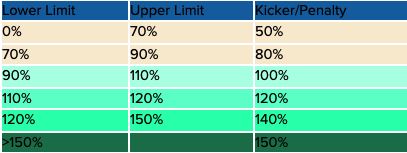How do you pay salespeople fairly if you are an early-stage startup?
Despite their critical role in driving growth, salespeople in many startups are often not compensated fairly for their efforts.
It can lead to high turnover, low morale, and a negative impact on your organisation.
Early-stage organisations are also very fragile and need a system to avoid bad decisions. It can lead to companies going out of business.
Here is a 6-point compensation plan system you can use:
Pay salespeople based on their % achievement vs set goal.
The average SaaS AE can bring an average €250-350K ARR.
Give a reasonable goal to start.
Aim for a 2-3X Cost of Revenue Ratio for the first time. (salary+bonus+taxes vs revenue brought in by the person).
In addition, assign to each sales role (SDR, AEs, AM, CSM) a yearly bonus (OTE).
Then deploy a system that pays monthly or quarterly depending on your financials.
Use a scale that allows you to pay salespeople when they hit a specific % achievement.
In this way, you have a minimum revenue guaranteed before paying out.
Also, have a lower limit (i.e. 50%) and an upper limit together with a kicker/penalty. If you want to be generous you can set a lower limit.
Some companies pay from 0%, others from 30% or 50%.
Example:
Commission Payout = Monthly bonus x % achievement x Penalty/Kicker.

Commission plans are uncapped. If you set the right goal you shouldn't be surprised.
Also, if you close-won a multi-million dollar deal and didn't know...well, you should be happy anyway.
Putting a cap means putting a cap on performance and you want to foster an over-performing team.
Have a three months clause if your won customers don't pay.
At this stage, there might be emotional buying and customers not paying.
Have a system that claws back the commissions paid if there is a fallback in getting the money in.
Design compensation plan for sales roles
AEs, SDRs, AMs, and CSMs should have different compensation plans.
For example: pay SDRs on demo booked, AEs on closed won. AMs on renewal/upsell vs their baseline.
Comp plan at your company's stage should be quarterly.
The whole system needs refinement based on data until you hit the right one.
For example: If nobody is hitting the goal, you need to lower your quota. Instead, if a part of your business is hitting consistently, then goals need to be adjusted.
The objective is to establish a culture of top performance where people should expect the right output for their inputs.
Bonus point: you should take time to explain the comp plan and gain feedback from your teams. Never communicate top-down. Always seek your teams' input before finalising it.
Finally, you have a system that can set you apart from other startups and attract top talents.